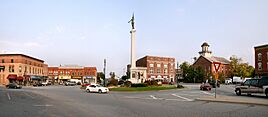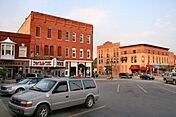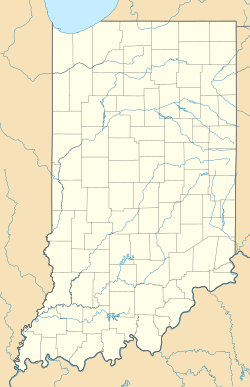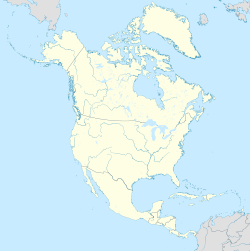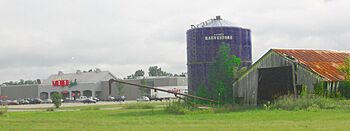Angola, Indiana facts for kids
Quick facts for kids
Angola
|
|
|---|---|
|
Downtown Angola's traffic circle
Historic Theater
Powers Church
Lake James
Cyrus and Jennie Cline House
|
|
| Motto(s):
"Proud of our past. Planning for our future."
|
|
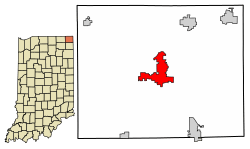
Location of Angola in Steuben County, Indiana.
|
|
| Country | United States |
| State | Indiana |
| County | Steuben |
| Township | Pleasant |
| Area | |
| • Total | 6.54 sq mi (16.94 km2) |
| • Land | 6.49 sq mi (16.82 km2) |
| • Water | 0.05 sq mi (0.12 km2) |
| Elevation | 1,037 ft (316 m) |
| Population
(2020)
|
|
| • Total | 9,340 |
| • Density | 1,438.69/sq mi (555.45/km2) |
| Time zone | UTC-5 (EST) |
| • Summer (DST) | UTC-4 (EDT) |
| ZIP code |
46703
|
| Area code | 260 |
| FIPS code | 18-01666 |
| GNIS ID | 2393958 |
Angola is a city located in Pleasant Township, Steuben County, Indiana, in the United States. It is the main city and county seat of Steuben County. In 2020, about 9,340 people lived there.
Angola was started by Thomas Gale and Cornelius Gilmore on June 28, 1838. It is home to Trine University, a well-known school. Major highways like I-69 and the Indiana Toll Road (which includes I-80 and I-90) serve the city, making it easy to get to.
Contents
History of Angola
The first post office in Angola opened in 1838. This was the same year the city was founded.
Some of the first people who settled here came from a place called Angola, New York. They decided to name their new home "Angola" after their old one.
Important historical buildings in Angola are recognized nationally. These include the Angola Commercial Historic District, the Steuben County Courthouse, and the Steuben County Jail. These places are listed on the National Register of Historic Places. This means they are important to the history of the United States.
A sociologist named Newell LeRoy Sims studied the town in 1912. He wrote about it in his PhD paper, using the name "Aton" for the village.
Angola's Geography
The center of Angola is where two main roads meet: U.S. 20 and State Road 127. Locals know these roads as North and South Wayne Street and West and East Maumee Street.
In 2010, Angola covered about 6.39 square miles (16.55 square kilometers). Most of this area, about 6.34 square miles (16.42 square kilometers), is land. A small part, about 0.05 square miles (0.13 square kilometers), is water.
Angola's Climate
Angola has different weather throughout the year. In January, the average high temperature is about 30.5°F (-0.8°C), and the average low is 16.0°F (-8.9°C). In July, it gets warmer, with average highs around 81.8°F (27.7°C) and lows around 61.2°F (16.2°C).
The city usually has about 7.5 days each year where the temperature reaches 90°F (32°C) or higher. It also has about 28 days where the temperature stays at or below freezing (32°F or 0°C). Sometimes, it gets very cold, with about 2 days a year dropping to 0°F (-18°C) or lower. The hottest day ever recorded was 106°F (41°C) on July 13, 1936. The coldest was -27°F (-33°C) on January 4, 1981.
Angola gets about 38.78 inches (985 mm) of rain each year. There are usually about 128 days with some rain or snow. The most rain in one month was 12.23 inches (311 mm) in May 1943.
Snowfall averages about 38.9 inches (988 mm) per year. There are about 26 days with measurable snow. The most snow in one winter was 74.9 inches (1,900 mm) during 1981–82.
| Climate data for Angola, Indiana (1991–2020 normals, extremes 1898–1907, 1920–present) | |||||||||||||
|---|---|---|---|---|---|---|---|---|---|---|---|---|---|
| Month | Jan | Feb | Mar | Apr | May | Jun | Jul | Aug | Sep | Oct | Nov | Dec | Year |
| Record high °F (°C) | 67 (19) |
71 (22) |
85 (29) |
88 (31) |
93 (34) |
102 (39) |
106 (41) |
102 (39) |
101 (38) |
97 (36) |
83 (28) |
71 (22) |
106 (41) |
| Mean maximum °F (°C) | 52.8 (11.6) |
55.0 (12.8) |
67.7 (19.8) |
77.8 (25.4) |
84.9 (29.4) |
90.6 (32.6) |
90.8 (32.7) |
89.7 (32.1) |
86.8 (30.4) |
79.4 (26.3) |
65.5 (18.6) |
55.4 (13.0) |
92.9 (33.8) |
| Mean daily maximum °F (°C) | 30.5 (−0.8) |
33.9 (1.1) |
44.8 (7.1) |
57.7 (14.3) |
69.4 (20.8) |
78.4 (25.8) |
81.8 (27.7) |
80.0 (26.7) |
73.6 (23.1) |
60.9 (16.1) |
47.1 (8.4) |
35.7 (2.1) |
57.8 (14.3) |
| Daily mean °F (°C) | 23.3 (−4.8) |
25.6 (−3.6) |
35.1 (1.7) |
46.8 (8.2) |
58.6 (14.8) |
68.1 (20.1) |
71.5 (21.9) |
69.7 (20.9) |
62.4 (16.9) |
50.7 (10.4) |
38.8 (3.8) |
28.9 (−1.7) |
48.3 (9.1) |
| Mean daily minimum °F (°C) | 16.0 (−8.9) |
17.2 (−8.2) |
25.5 (−3.6) |
36.0 (2.2) |
47.8 (8.8) |
57.8 (14.3) |
61.2 (16.2) |
59.3 (15.2) |
51.2 (10.7) |
40.4 (4.7) |
30.4 (−0.9) |
22.2 (−5.4) |
38.7 (3.7) |
| Mean minimum °F (°C) | −5.8 (−21.0) |
−1.4 (−18.6) |
7.7 (−13.5) |
21.6 (−5.8) |
32.6 (0.3) |
43.9 (6.6) |
49.8 (9.9) |
48.2 (9.0) |
38.0 (3.3) |
27.0 (−2.8) |
15.8 (−9.0) |
3.6 (−15.8) |
−9.2 (−22.9) |
| Record low °F (°C) | −27 (−33) |
−23 (−31) |
−13 (−25) |
4 (−16) |
22 (−6) |
32 (0) |
40 (4) |
37 (3) |
27 (−3) |
16 (−9) |
−4 (−20) |
−19 (−28) |
−27 (−33) |
| Average precipitation inches (mm) | 2.57 (65) |
2.31 (59) |
2.49 (63) |
3.59 (91) |
4.39 (112) |
4.08 (104) |
3.79 (96) |
3.93 (100) |
3.17 (81) |
2.95 (75) |
3.00 (76) |
2.51 (64) |
38.78 (985) |
| Average snowfall inches (cm) | 11.8 (30) |
10.3 (26) |
5.3 (13) |
1.0 (2.5) |
0.0 (0.0) |
0.0 (0.0) |
0.0 (0.0) |
0.0 (0.0) |
0.0 (0.0) |
0.1 (0.25) |
2.3 (5.8) |
8.1 (21) |
38.9 (99) |
| Average precipitation days (≥ 0.01 in) | 13.0 | 10.5 | 10.8 | 11.7 | 11.7 | 10.8 | 9.1 | 9.1 | 8.3 | 10.5 | 10.8 | 12.2 | 128.5 |
| Average snowy days (≥ 0.1 in) | 7.7 | 6.6 | 3.0 | 0.9 | 0.0 | 0.0 | 0.0 | 0.0 | 0.0 | 0.0 | 2.1 | 5.8 | 26.1 |
| Source: NOAA | |||||||||||||
Angola's Population and People
Population Changes Over Time
| Historical population | |||
|---|---|---|---|
| Census | Pop. | %± | |
| 1850 | 226 | — | |
| 1870 | 1,072 | — | |
| 1880 | 1,280 | 19.4% | |
| 1890 | 1,840 | 43.8% | |
| 1900 | 2,141 | 16.4% | |
| 1910 | 2,610 | 21.9% | |
| 1920 | 2,650 | 1.5% | |
| 1930 | 2,665 | 0.6% | |
| 1940 | 3,141 | 17.9% | |
| 1950 | 5,081 | 61.8% | |
| 1960 | 4,746 | −6.6% | |
| 1970 | 5,117 | 7.8% | |
| 1980 | 5,486 | 7.2% | |
| 1990 | 5,824 | 6.2% | |
| 2000 | 7,344 | 26.1% | |
| 2010 | 8,612 | 17.3% | |
| 2020 | 9,340 | 8.5% | |
| U.S. Decennial Census | |||
In 2010, there were 8,612 people living in Angola. There were 3,111 households, which are groups of people living together. The city had about 1,358 people per square mile.
Most people in Angola (about 93.6%) were White. There were also smaller groups of African American, Native American, and Asian residents. About 6.3% of the population was of Hispanic or Latino background.
The average age in Angola was about 30.3 years old. About 22.1% of the people were under 18. About 21.2% were between 18 and 24 years old. The city had slightly more males (50.6%) than females (49.4%).
Media in Angola
Angola has its own local media to keep residents informed and entertained.
Radio Stations
You can listen to these radio stations in Angola:
- 100.3 WLKI-FM wlki
- 92.7 HOT FM 92.7
- 101.3 U-Rock
Television Stations
Angola has one local TV station:
- 63 WINM
WINM is a religious TV station. Most people in Angola get their main TV channels from Fort Wayne, a larger city nearby.
Newspapers
The local newspaper for Angola and Steuben County is The Herald Republican. It started by combining two older weekly newspapers, the Steuben Republican (from 1857) and The Angola Herald (from 1876). They merged into one newspaper in 1980 and became a daily newspaper in 2001.
Transportation in Angola
Angola is served by Barons Bus Lines. These buses travel between Cleveland, Ohio, and Chicago, Illinois, and back. They offer local stops, mostly along US Route 20. These bus routes are important for transportation in the area.
Education in Angola
The Metropolitan School District of Steuben County runs several schools in Angola:
- Carlin Park Elementary
- Hendry Park Elementary
- Ryan Park Elementary
- Pleasant Lake Elementary
- Angola Middle School
- Angola High School
- Educational Opportunity Center
Angola is also home to Trine University, a four-year college.
For reading and learning, the Carnegie Public Library of Steuben Co. is a lending library available to everyone.
Notable People from Angola
Many interesting people have connections to Angola:
- Lloy Ball, an Olympic gold medalist in volleyball.
- John Barnes, a science-fiction writer.
- Hagood Hardy, a Canadian-American jazz musician and composer.
- Lewis Blaine Hershey, a U.S. Army general who was the second Director of the Selective Service.
- Lois Irene Marshall, the wife of U.S. Vice President Thomas R. Marshall.
- Edward Ralph May, a lawyer who was the only person at the 1850 Indiana Constitutional Convention to vote for African American suffrage.
- Wilbur Simpson, a classical bassoon player.
- Raymond E. Willis, a U.S. Senator.
- J. Walter Yeagley, a former judge.
See also
 In Spanish: Angola (Indiana) para niños
In Spanish: Angola (Indiana) para niños
 | Delilah Pierce |
 | Gordon Parks |
 | Augusta Savage |
 | Charles Ethan Porter |


